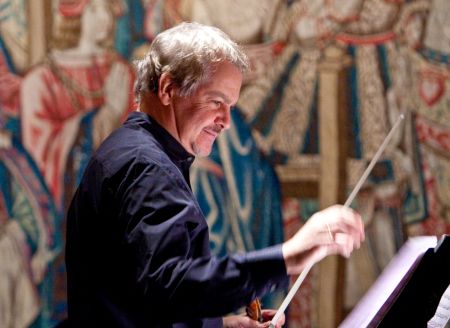
Bass Museum Concert Celebrates Music From a Legendary Salon
“She looked like Dante and was very masculine and imposing,” Igor Stravinsky once said of his friend and patron, the Princesse de Polignac. “Her ambition was to have her bust next to Richelieu’s at the Louvre.”
Ambition indeed, but the princess, who was born Winnaretta Singer in Yonkers, N.Y., and an heir to the Singer sewing machine fortune, secured her place in music history by running a salon in Paris in the first decades of the last century at which the most important composers and musicians of the day gathered for audience and sustenance.
This weekend at the Bass Museum of Art on Miami Beach, violinist Gil Morgenstern offers the first in his three Reflections programs in the museum’s Taplin Gallery with a concert of music associated with Singer’s salon.
“While there were quite a few salons in Europe at the time, Winnaretta Singer’s was one of the most interesting; it seems that just about every major composer and performer stopped by the Singer Salon — if they were lucky enough,” Morgenstern wrote in an e-mail message. “The list of artists is astounding. The program I’ve put together is not so much about Winnaretta Singer as it is about the incredibly high quality of music and the great performers that she attracted.” The music on the program includes “works that were either commissioned by her, dedicated to her or premiered at her salon, as well as existing works” performed there, he wrote.
Morgenstern will be joined by the soprano Deborah Selig and pianist Hiromi Fukuda for the 3 p.m. concert, which will feature the Violin Sonata of Debussy, the Suite Populaire Espagnole of Manuel de Falla, Ravel’s Gypsy showpiece Tzigane, and movements from two violin-and-piano works by Stravinsky: the Duo Concertant and the Divertimento, which is drawn from his score for the ballet The Fairy’s Kiss.
Also on the program are three groups of songs by Ravel (from the Cinq Mélodies Populaires Grecques and the Chants Populaires), Fauré (including the familiar Après un rêve) and Schubert.
Sunday’s concert , called A Midday Soirée, is meant to evoke the informal atmosphere of the salon, Morgenstern wrote. “Composers may have only brought one or two movements of a piece they were working on, or they would make arrangements to accommodate the musical forces on hand … So each set of works will be introduced by the performers (who will also turn pages for the pianist when they aren’t actually performing).”
Putting semi-theater events like this has been the work of about 20 years for Morgenstern, who said he began with a music and dance company formed with dancer Mary Cochran. Later, with the writer Jonathan Levi, Morgenstern formed the Nine Circles Chamber Theatre “to explore the intersection of words and music,” and in 2007, Morgenstern’s first Reflections concert debuted at the Rubin Museum in New York.
Reflections came out of the Nine Circles work, “as I began to focus on the various disciplines in as intimate a setting as I could find, one that would remove me from the stage, put me as close to the audience as possible, thus drawing them into the performance,” he wrote.
In addition to the Bass Museum, Reflections concerts are being given this season at the WMP Concert Hall in New York and are set for next summer at the Appalachian Summer Music Festival in Boone, N.C.
Singer’s support was central to a significant portion of early 20th-century artistic endeavor. Her salon was the site in 1909 of the initial discussions that led to Serge Diaghilev’s founding of the Ballet Russes, as Roger Nichols points out in his study The Harlequin Years. Stravinsky’s Les Noces, Mavra, Renard, Oedipus Rex and the Piano Concerto came out of the salon, as did the Two-Piano and Organ concerti of Poulenc , Satie’s Socrate and the El Retablo de Maese Pedro of de Falla.
All this, despite Singer’s notorious cheapness. The pianist Arthur Rubinstein called her “the stingiest woman I ever met in my whole life,” according to Nichols, but nevertheless she used her great wealth to shrewd effect. Patronage remains as vital to the life of the arts as it has ever been, Morgenstern wrote.
“The more cultured a society is, the broader the patronage will be (whether private, corporate or public). When culture is not valued, support for the arts is left to the true believers, who are besieged by solicitations,” he wrote. “Thank goodness such dedicated and generous people still exist (especially in today’s economy). I cannot say, however, that I’m sanguine about the future.”
The art survives long after the patrons and creators have left the stage, and while we only know who Prince Andrei Rasumovsky was today because he commissioned three great Beethoven string quartets, it’s nevertheless useful to get some sense of the original milieu that inspired it.
The artistic heritage of the West would be decidedly different without the help of wealthy enthusiasts, and Sunday’s concert offers an interesting way to consider the factors of chance and luck in bringing that heritage about.
Recent Content
-
Artsarticle ·
-
Artsarticle ·
-
Artsarticle ·
